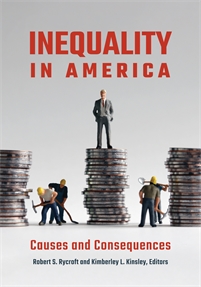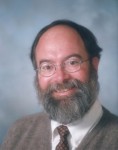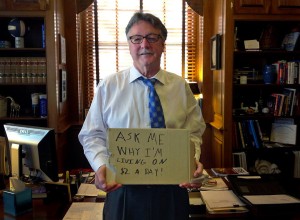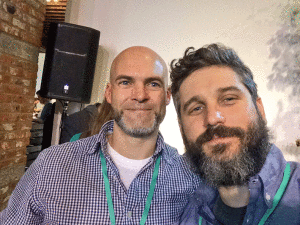 On June 30, College of Business Senior Lecturer Kimberley Kinsley and Professor of Economics Robert Rycroft will have a book published, Inequality in America: Causes and Consequences, Santa Barbara, CA:ABC-CLIO. https://products.abc-clio.com/ABC-CLIOCorporate/product.aspx?pc=A5815C. It is an edited book consisting of 35 essays written by 50 authors, with substantial contributions from Kinsley and Rycroft. Kinsley wrote a chapter about civil justice. Rycroft, along with Lauren DiRago-Duncan ’15, now a Ph.D. candidate at the University of Kentucky, wrote a chapter on labor markets. Both Kinsley and Rycroft wrote the preface and a chapter on wealth inequality. In addition, Assistant Professor of Education Christy Irish, along with Allison Ward Parsons from George Mason University’s College of Education and Human Development, wrote a chapter on education reform policies. President Troy Paino wrote the introduction.
On June 30, College of Business Senior Lecturer Kimberley Kinsley and Professor of Economics Robert Rycroft will have a book published, Inequality in America: Causes and Consequences, Santa Barbara, CA:ABC-CLIO. https://products.abc-clio.com/ABC-CLIOCorporate/product.aspx?pc=A5815C. It is an edited book consisting of 35 essays written by 50 authors, with substantial contributions from Kinsley and Rycroft. Kinsley wrote a chapter about civil justice. Rycroft, along with Lauren DiRago-Duncan ’15, now a Ph.D. candidate at the University of Kentucky, wrote a chapter on labor markets. Both Kinsley and Rycroft wrote the preface and a chapter on wealth inequality. In addition, Assistant Professor of Education Christy Irish, along with Allison Ward Parsons from George Mason University’s College of Education and Human Development, wrote a chapter on education reform policies. President Troy Paino wrote the introduction.
Kinsley, Rycroft to Publish Book on Inequality in America
Greenlaw Comments on Open Educational Resource Tools

Professor of Economics Steven Greenlaw
Professor of Economics Steve Greenlaw was recently interviewed in an article on Ed Surge entitled, “‘Better Every Semester’: How Faculty Use Open Educational Resources to Improve Courses.”
In addition to providing students with text and video content, courseware tools also have built-in nudges and assessments—sometimes personalized—that generate instant feedback about whether students are mastering the assigned material.
That data allows an entity like Lumen to “crunch the numbers and figure out where the problems are” with courseware texts and tests, then fix those problems, says Steve Greenlaw, a professor of economics at the University of Mary Washington, who has helped to produce OER resources for Lumen and for OpenStax, a nonprofit OER publisher, and who uses Lumen courseware with his own classes. Read more.
Rycroft Discusses How Virus-Linked Recession Affects Women, Minorities

Professor of Economics Robert Rycroft
Professor of Economics Robert Rycroft recently discussed with Courthouse News the effect the recession, due to the COVID-19 pandemic, has had on women and minorities.
Pew reported Thursday that women, particularly Hispanic women, fared much worse in the coronavirus recession than during the Great Recession of 2007-09. Conversely, African-American men, who saw a peak unemployment of 21.2% during the Great Recession, have seen only a 15.8% top unemployment rate this time around.
“The disparities have a lot to do with the different mix of occupations,” said Robert Rycroft, an economics professor at the University of Mary Washington. Rycroft noted that in previous recessions manufacturing and construction suffered more than the service sector. “Some jobs were very susceptible to the effects of the virus,” Rycroft said. Read more.
Greenlaw Quoted on Grade Distribution in Inside Higher Ed
Professor of Economics Steven Greenlaw was quoted in an article on InsideHigherEd.com entitled “Forced to Fail Students?” The article examines an accusation by a former professor at Arizona State University who says he was fired for failing to adhere to grading quotas. “Asking professors to strictly follow a grade distribution is highly unusual,” Greenlaw said. “If a professor is giving out too many A’s, that might necessitate a conversation, but not a mandate to fail a specific proportion of the class.” Read more.
President Hurley Is Taking the Two Dollar Challenge, Will You?
That’s right – our own president is taking the Two Dollar Challenge April 6-10 to raise awareness of global poverty. The question is – will you?
 Now a national educational movement, the Two Dollar Challenge was founded at UMW in 2006 and is run by eight UMW students and Professor of Economics Shawn Humphrey – all on $50 and volunteer support.
Now a national educational movement, the Two Dollar Challenge was founded at UMW in 2006 and is run by eight UMW students and Professor of Economics Shawn Humphrey – all on $50 and volunteer support.
The 5-day awareness program challenges college and high school students across the United States to live on just two dollars a day. Participants buy food, hygiene products and other necessities out of two dollars a day while following other rules designed to simulate obstacles faced by people living in poverty.
At UMW, students will spend the week living and sleeping in make-shift shelters built from cardboard boxes and tarps as part of an experiential learning experience.
So I have to sleep in a tent on Ball Circle?
Not at all. Start small with the beginner level – 3 days and 2 nights with $6 total to spend and you can sleep in your own bed and take hot showers in your own home.
Want to sign up or learn more?
- Visit the challenge’s website at twodollarchallenge.org.
- Come to an information session Thursday, March 19 at 5 p.m. in the ITCC’s Digital Auditorium.
- Use #2DollarsADay to join the conversation on social media.
Hansen Publishes in Business History Review
Professor of Economics Bradley A. Hansen’s article “A Failure of Regulation? Reinterpreting the Panic of 1907” was recently published in Business History Review.
Students Meet with Nobel Peace Prize Winner
Associate Professor of Economics Shawn Humphrey and more than a dozen current UMW students and graduates met with Bangladeshi banker, economist and Nobel Laureate Muhammad Yunus during a trip to Washington, D.C. on Monday, July 22. The meeting was a reward for the students’ work with the Month of Microfinance and La Ceiba.
Yunus, founder of the Grameen Bank, is the seventh person to have received the Congressional Gold Medal, the Presidential Medal of Freedom and the Nobel Peace Prize. He is credited with establishing the concept of microfinance and was recently named one of the most influential business thinkers by the Wall Street Journal.




